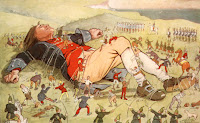 So, am I the only one who gets the dictionary.com word of the day?
So, am I the only one who gets the dictionary.com word of the day?
See, vocabulary used to be my thing. I could go over a list of words, word, synonym, part of speech, word used in a sentence, brief etymology, connotation/denotation– I had three lists, one for 10th, one for 11th, one for 12th grade. Each list had fifteen words a week, for 17 weeks a semester. Some of the words were recursive, but by no means all of them, and yeah. I knew them all.
I was pretty good.
So anyway, when I no longer taught school, I got dictionary.com, and learned just how pedestrian “pretty good” really was.
Every morning I wake up and there’s a new word in my inbox. And I have one of three reactions to it:
A. I know what that word means. I can delete that message.
B. Not only do I not know what that word means, but that word is so far outside of my experience as to not even be English. If I looked that word up (and I sometimes do) I will find that the last time this word was used was in the 19th century, inside a textbook or a political treatise by someone I barely remember. If I actually used that word, my editors would accuse me of making it up, showing the fuck off, or smoking some really good weed and not sharing. I can delete that message.
C. That word is vaguely familiar to me, but obscure enough to be a challenge. I might be able to use that word, and, more importantly, I might be able to remember that word while I am engaged in an occupation which usually precludes me from remembering things like taking a leak or basic hygiene. I shall open that message.
And sometimes the words stick!
Today’s word was “pasquinade”.
Now I like this word– it’s a word with satin and lace in it, redolent of sweetmeats and the smell of hair powder and body odor in a crowded ballroom. This word has repressed venomous seductresses and politically jaded rakes all buried in its latinate decadence. I want to live this word.
And then I look up the definition, and, sure enough, it means a satire or a lampoon, a skit or a piece of comedy designed to show someone at their worst light.
This word is a gourmet word. It is delicious. I adore this word.
Not only does it sound decadent– the thing it means?
Is one of the things I believe most in the world.
Power is abstract. Suffering is concrete. Statistics are abstract. Empathy is immediate. Politics are abstract. Laughter is action. I am a very human believer that the only way to change the world is to affect the emotions of the human beings in it.
If you want the people in power to see themselves as ridiculous, you must laugh at them.
And hence, the pasquinade.
People will do almost anything to avoid being laughed at.
Now, sometimes this backfires. I’m pretty sure that history is littered with the bloody heads of the people who enraged their leaders with a poorly timed snarky joke–but, on the plus side, bloody heads can be just as effective in rendering change as a vicious satire. But, even then, it all started with the pasquinade.
And it gets even better than that! Imagine the complexity of the society that could build, sound by glyph, such a complex word! We had to have a government, and we had to have arts and culture, and we had to understand that concept (and it’s a tough one, trust me!) that what someone says is not always what they mean. Entire books–hell, entire genres–hell, damned near whole societies have been built on that concept alone! And then, we had to take an example of government and irony, and we had to give it a name.
Am I the only one with the chills? (Yes. Amy you are the only one with the chills. Go put on some slippers and stop pretending you have a brain.)
But see, I’ve always loved a good satire. Teaching students to look beyond the “Please don’t eat the babies!” horror of A Modest Proposal was one of the highlights of my teaching year. I loved that you had to listen to the tone of voice in that essay to hear the biting satire. I loved that Gulliver was a satiric hero, and that so are Forrest Gump and Charlie Brown and Homer Simpson. I love that we have formed a heroic archetype around the wide-eyed, ingenuous person that we are when we discover that government is corrupt and that the leaders around us fail. We expected people to say what they meant, and when we discovered that we were a wide-eyed rube, being betrayed, oh fear our intellectual wrath, because we were gullible and easily mocked for a day. The fuckers who did that to us are going to be mocked forever.
And hence, pasquinade.
 And hence, my wet-panties at even a hint of an exotic tryst with the English language. Ah, words, you were my first and most creative lover, and I’m sure you will be giving me plenty of thrills when the joys of the flesh are long forgotten.
And hence, my wet-panties at even a hint of an exotic tryst with the English language. Ah, words, you were my first and most creative lover, and I’m sure you will be giving me plenty of thrills when the joys of the flesh are long forgotten.
And you’re awfully fun when you’re playing dirty, too.














